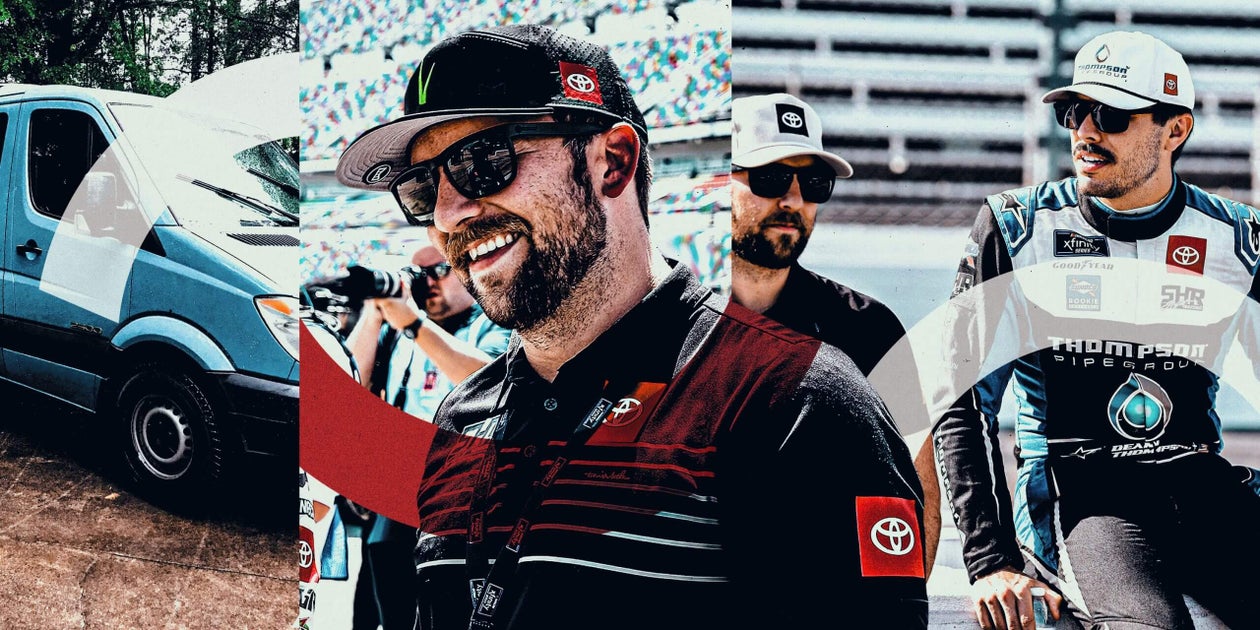MOORESVILLE, N.C. — The tales of sacrifice people have made to find a path in NASCAR are part of the fabric of the sport. Competing at NASCAR’s national level is expensive, and to make it, one often must cut corners to save money, all with the hope of realizing a dream that stands a good chance of not fully materializing.
Xfinity Series team owner Sam Hunt knows this all too well. The native Virginian was living in his home state eight years ago, having recently graduated from Virginia Commonwealth University with a degree in finance, while also racing as the owner of just a single car, which he competed with locally.
However, while he had a job offer outside the sport, Hunt’s ambition was compelling him to pursue his dream. He wanted to own a competitive team that raced at NASCAR’s grassroots level and, someday, grow into a team that raced at the sport’s national level.
Sitting on his couch alongside his then-girlfriend, now-wife, Noelle, Hunt looked at her and shared his vision. She told him to go for it, even if it would cause a significant upheaval in their relationship.
“My dad’s a high school football coach, and he could have coached college for many years … but he just loved high school football so much, and so he stuck with that,” Noelle Hunt said. “And so when Sam told me, I was just like, ‘Try it. If it doesn’t work, you have a degree and you can go get a big-boy job.’ ”
For Hunt to do this, he had to relocate to the Charlotte, N.C., area, where nearly every team across NASCAR’s three national series (Cup, Xfinity and Trucks) is based. Moving was expensive, to say the least, and the operational costs associated with starting a team were even more substantial.
“Well, I’m just stupid,” Hunt said, laughing, noting how someone with a finance degree should know better than to enter the world of NASCAR team ownership.
However, with ambition overriding sound judgment, Hunt forged ahead. He moved to Mooresville, N.C., a suburb of Charlotte, setting up the LLC for his new company, Sam Hunt Racing, during the drive from Virginia.
For the first six months, Hunt lived in a blue Ford Transit van parked in a lot at a race shop where he was renting space. Each morning, he’d wake up, go inside the shop to work on building cars, then when the day was over, he’d go to a nearby gym to shower.
If the team did exceptionally well on a weekend, he’d occasionally splurge and rent a room at a cheap motel. That van also served as a means of transporting the entire team to races, as well as to the year-end awards ceremony, which created an awkward moment.
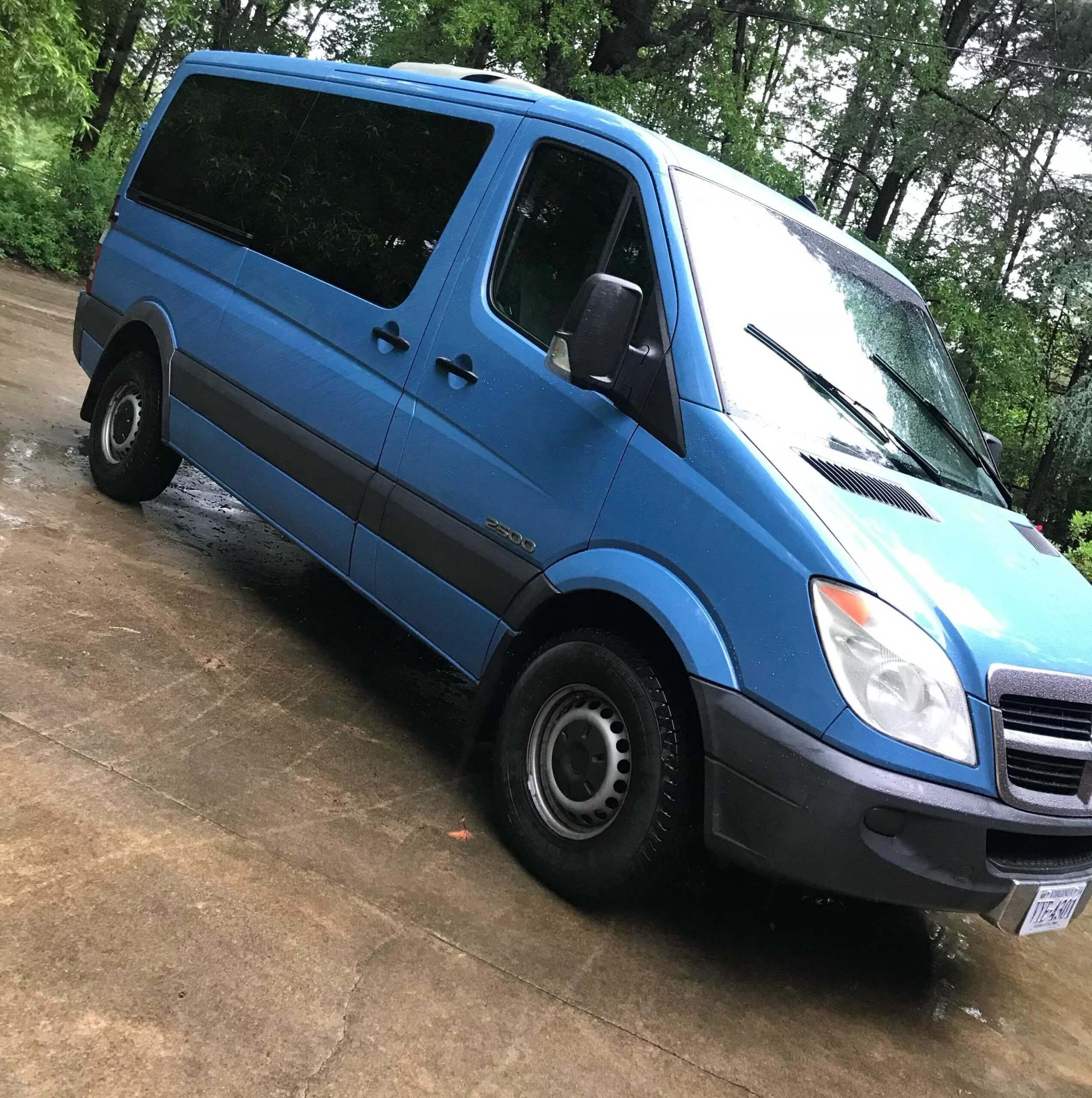
The blue Ford Transit van that served as Sam Hunt’s original home as he started Sam Hunt Racing. “That van squealed so bad,” recalls Hunt’s wife, Noelle. (Courtesy of Sam Hunt Racing)
“We’re out in the valet area and like everyone’s getting into these nice cars, then you hear this squealing in their parking deck garage, and then the blue van comes out and pulls up,” Hunt said. “And I’ll never forget, stuck to the back, there’s a piece of toilet paper or napkin on the back tire.”
As Hunt recalls the story, Noelle shakes her head at the memory.
“That van squealed so bad,” she adds. “Everyone was looking at us.”
Gradually, SHR grew into a competitive team in the ARCA East series, effectively NASCAR’s rookie league. However, Hunt’s journey wasn’t over yet.
Eight years later, Hunt is the owner of a full-time Xfinity team — a stable one, with 23 full-time employees. SHR made its Xfinity debut in 2019, entering the season finale at Homestead. To afford a pit crew, something not required in the series in which SHR regularly competed, Hunt had to sell his van.
That race was pivotal. Had they failed to qualify, SHR would have faced a long winter with the real prospect of closing down. However, the team qualified, and a potential disaster was averted. The following year saw an increase to nine races, then full-time beginning in 2021.
“It’s stressful having the weight of that on you, but it’s also the most rewarding thing in the world knowing you’re not only taking care of people but their families,” Hunt said. “That is like ultimate fulfillment for me.”
Amid SHR’s emergence, going against bigger teams with more resources and deeper pockets, Hunt’s path to this spot has become one of the sport’s feel-good stories.
“What they’re able to do with the resources they have is impressive,” said Tyler Reddick, a full-time Cup driver who’s made select Xfinity starts for SHR. “Sam works so hard to get his team everything that he can, and it’s hard not to want someone like him to succeed and do well.”
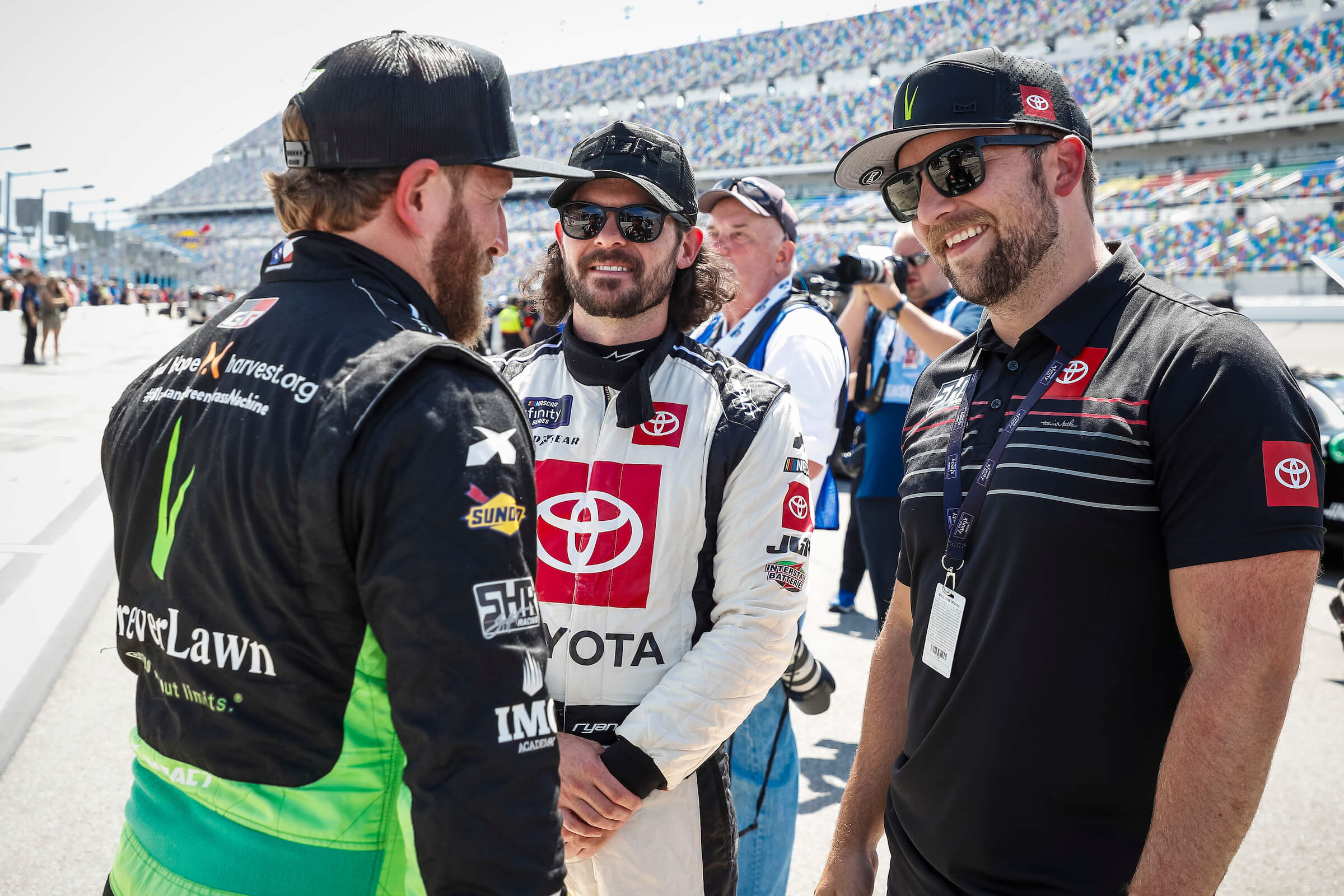
“It’s hard not to want someone like him to succeed and do well,” Tyler Reddick (left) says of Sam Hunt (right). (Toyota GAZOO Racing / Courtesy of Sam Hunt Racing)
Like many similarly sized teams operating on a modest budget, it’s a must to be creative in how money is spent. NASCAR is a sport where money equates to speed, but you also can’t spend what you don’t have. Finding success means finding other avenues to glean an advantage.
Hunt has focused on hiring individuals who are either pursuing their first big break or seeking a fresh start in a sport that often consumes people.
Within the past year, he has made two notable hires that fit this mold: SHR signed rookie Dean Thompson as the full-time driver of its primary Toyota entry and Jesse Little as vice president of business development. Thompson had some success in the NASCAR Truck Series, although not to the level he had hoped for, while Little wanted to return to the competitive aspect of the sport after working for NASCAR on the officiating side.
“We’re all chip-on-our-shoulder kind of people,” Thompson said. “And we’re also all the same personality. I feel like we all just pull the rope the same way. There’s no one there for their own means; everyone wants the team to succeed for themselves. I feel like from the moment I met them, I knew the culture was exactly where I wanted to be.”
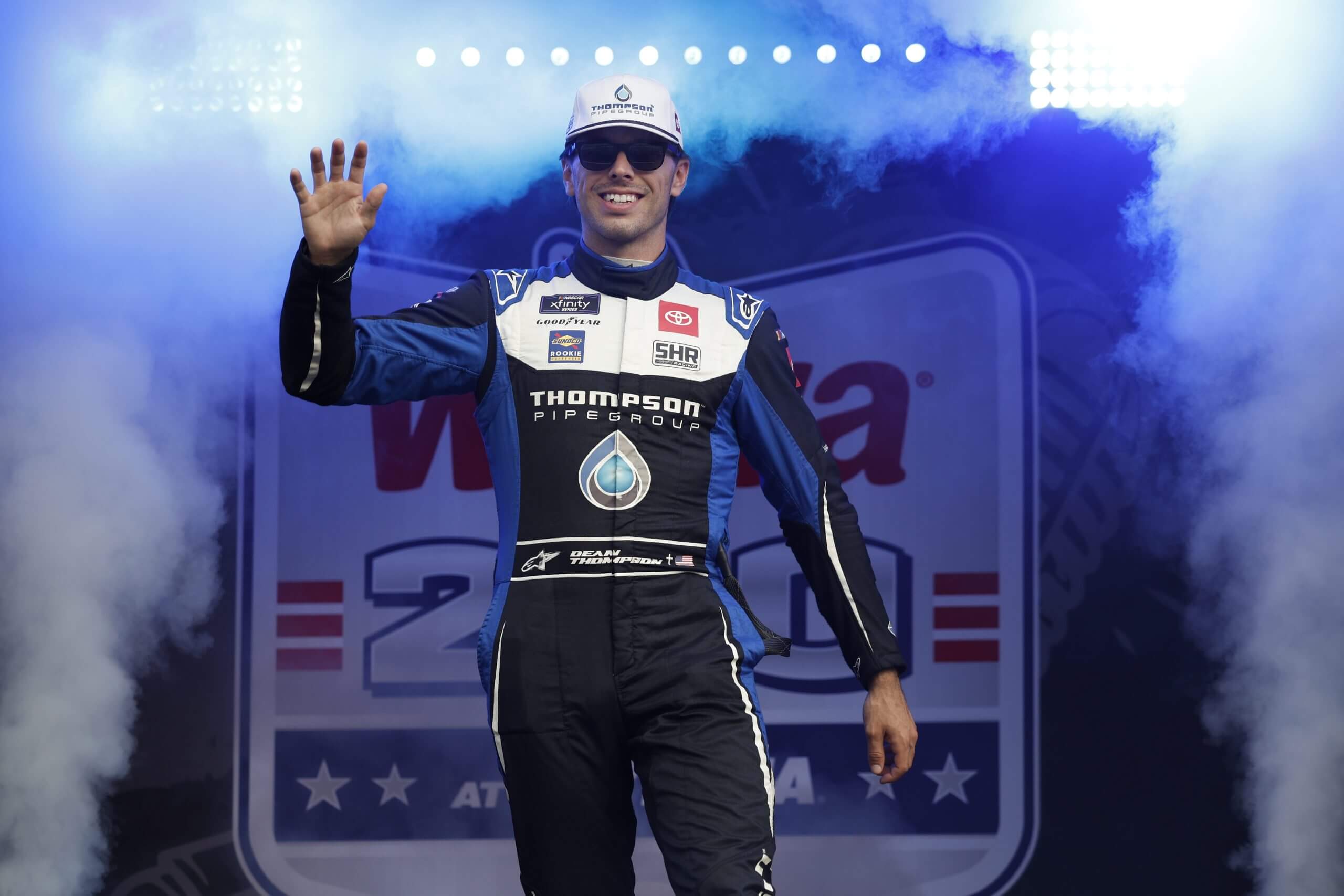
“We’re all chip-on-our-shoulder kind of people,” says Dean Thompson, Xfinity Series driver for Sam Hunt Racing, of the team’s culture. (Sean Gardner / Getty Images)
When asked how he’d describe SHR, Jack Irving, Toyota Racing Development’s general manager, broke out into a wide smile. From Irving’s perspective, SHR resembles teams in stick-and-ball sports filled with castoffs and overlooked players who’ve forged a bond that lends itself to overachieving.
“They are this band of misfits that he’s put together,” Irving said. “They all stick together in an underfunded, but super hard-working group. They’re all in. They’re constantly upgrading, and they’re constantly trying to get better. And he’s got guys who don’t always fit into the big corporate teams, and he has them with his team and they love it.”
Although not part of SHR, Irving understands the organization’s foundation, having played an instrumental role in its growth. Through a mutual connection — J.D. Gibbs, the late son of NASCAR Hall of Fame team owner Joe Gibbs and a mentor of Hunt’s — Irving was introduced to Hunt and was impressed by his determination. Hunt was honest about what he could do and, most importantly, what he couldn’t do.
“All the small things (Hunt) did right,” Irving said. “And the small things are hard to do right, unless you care. … And then the more time you spend with him, you learn how genuine he was. It wasn’t a scam just like, ‘I want to be a Toyota, and I’m going to ask him for a bunch of money.’ He’s trying to do it the right way.”
Before long, SHR began receiving Toyota support that enabled the team to improve its then-modest on-track performance, allowing SHR to differentiate itself from most other similarly budgeted teams. The partnership is now such that Toyota has funneled some of its drivers to SHR, including Cup Series superstars Reddick and Christopher Bell, each of whom has raced a second SHR entry over the past few years, and Corey Heim, one of NASCAR’s highly regarded prospects.
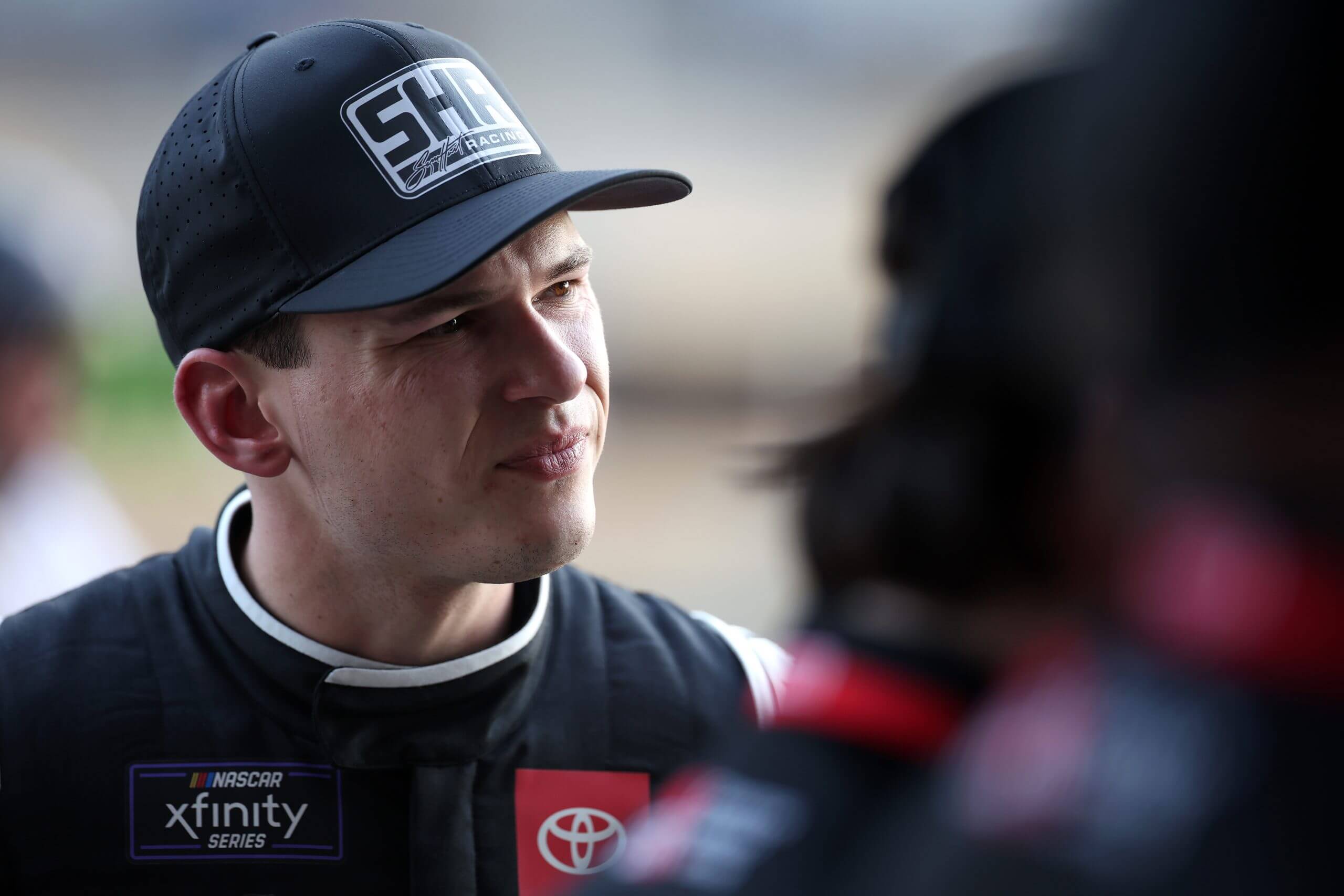
Toyota has entrusted Sam Hunt Racing with developing Corey Heim, one of NASCAR’s most promising driving prospects. (James Gilbert / Getty Images)
Entrusting Heim to SHR speaks to the confidence Toyota has in Hunt in placing a competitive team around the 23-year-old, who is near-universally recognized within the Cup garage as already being a “Sunday driver” — someone capable of racing in NASCAR’s premier series. Heim is expected to make frequent starts for the team next year, though barring sufficient sponsorship, it won’t likely be on a full-time basis.
SHR still has a long way to go to thoroughly check every box Hunt has on his list, as the team is still seeking its first-ever win or playoff berth.
When this happens, Noelle says she’ll need some assistance.
“I will be dragged to victory lane because I’ll pass out,” she said. “Then, I will be crying.”
This is a goal Hunt is bullish on fulfilling.
“The first couple years, I wanted it for me, like, selfishly, because of the work and, obviously, this whole story of putting this work in to achieve that one thing,” Hunt said. “Now, I want it equally as bad, but I want it for different reasons. I think about these people being in victory lane every day because I think it’d be the coolest thing in the world.
“We shouldn’t have ever become a team at this caliber; like we’re just doing things that I never thought in my wildest imagination would be possible. I want the people on this team to have it.”
(Top illustration: Kelsea Petersen / The Athletic; photos: Toyota GAZOO Racing, courtesy of Sam Hunt Racing)

